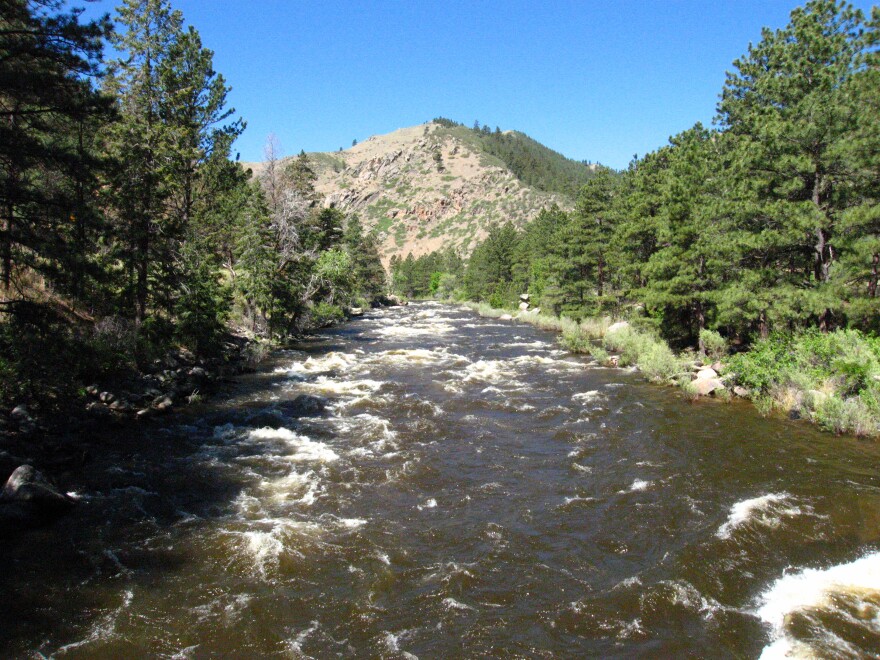More than thirty years ago, the city of Thornton purchased water rights along the Poudre River in Larimer County. Those rights, about 14,000 acre-feet, haven't been tapped for municipal use — until now.
On Aug. 1, the city will learn whether it can proceed with construction of a hotly-debated pipeline to funnel that water about 70 miles south.
In a scheduled meeting, Larimer County commissioners may award Thornton with a special land use permit. Thornton needs the permit to move forward with plans to build underneath Douglas Road, a heavily-populated area just north of Fort Collins.
The decision was supposed to come down in a meeting on July 9. But, due to massive public turnout, the vote has been delayed twice.
We break down what you need to know ahead of the decision.
What is happening at the Aug. 1 meeting?
Commissioners will first hear a rebuttal to public comments from Thornton. Upwards of 100 have been delivered.
The three Larimer commissioners will then have a chance to ask Thornton more questions about its application. After that, they’ll deliberate amongst themselves and likely make a final vote.
Larimer County and Thornton are fairly far apart. Why are the two tangled up in this?
The proposed pipeline route involves Thornton taking water out of the Poudre upstream of Fort Collins. To shuttle that water south, Thornton argues it must build through Larimer County.
In order to do that, it must go through the Larimer County commissioners.
The reason why Thornton needs the water in the first place is simple: population growth and overall water quality.
The city’s current population of roughly 136,000 is projected to jump to 242,000 by 2065, according to its permit application. To satisfy the needs of a growing community, it needs the pipeline to be up and running by 2025, the application says.
“In addition to meeting water demand, in adding this high-quality source the (pipeline) provides diversity, enhanced water supply, reliability, quality and drought resiliency to Thornton’s supply,” it reads.

Is the proposed route through Larimer County the only one available?
It depends on whom you ask.
If you ask Thornton, yes. If you ask some Larimer County residents, there are viable alternatives.
One alternative suggests leaving Thornton’s water in the Poudre until it reaches an access point farther downstream, near Windsor. At a hearing on July 9, Penny Hillman, a Douglas Road area resident, mentioned the idea in her public comment.
“Is the Poudre River the best route? I have no idea,” she said. “And neither does anyone else because it has never been fully and objectively vetted.”
Other supporters of the alternative route say it would improve river flow levels through Fort Collins and bolster overall river health, all while delivering water to Thornton faster and cheaper.
But Mark Koleber, Thornton Water Project director, said it wasn’t a viable alternative because it doesn’t take into the additional expenses it would entail.
“It doesn’t include the cost of replacing the storage, the lost water, the treatment costs we’d have to put in, the additional pipelines we might have to put in,” he said. “There’s a lot of additional costs that are out there that intentionally haven’t been included in the discussion.”
The Wednesday meeting is perhaps the end to a series of meetings and delays on the permit vote. What are the public commenters saying?
Most of the public comments at the July 9 and 23 meetings have been against the permit request.
Loretta Keaton lives along Douglas Road, where the proposed pipeline would be buried in Larimer County. At the July 23 hearing, she asked the commissioners to deny Thornton’s permit request due to traffic and safety concerns around the pipeline’s construction.
“I'm very concerned about the destruction of our road, as well as our quality of life,” she said. “The noise. The pollution. The large piles of dirt as well as large pieces of equipment and fuel fumes will be a nightmare.”
According to Thornton’s application, construction is supposed to take one to two years.
Fort Collins resident Steve Chaffey said the pipeline debate was indicative of a larger conversation around growth management that needs to occur in northern Colorado.
“There is a race upstream to get water out of the Poudre River,” he said. “The problem here isn’t necessary a pipeline and road – it’s the lack of a coordinated effort to utilize our limited resources for an exploding population.”
Jean Grove, who lives near the proposed pipeline route, spoke in favor of it.
“It’s going to be mutually difficult to have to be routed around and the construction,” she said. “However, water rights are something that can’t be fought except in a court of law.”
Attend the public hearing:
When: August 1, 2018 at 6:30 p.m.
Where: 200 W. Oak St., Fort Collins






